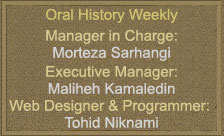| No. 611 | 25 November 2023 |
Problem of Narratives in Post-Revolution Iran and War(A look at the book »Line by Line Memory«; the manual for editing documentary memoir books)Due to the thematic connection of narrative and memory with oral history, the present article has been provided by the author herself (without changes) to the oral history website. The text of my speech about the book Line-by-Line Memory, which was held on November 13, 2023 in the Salman Herati Hall of the Art Department, in the presence of Morteza Ghazi, Masoumeh Ramehrrmazi, Razieh Haghighat and performed by Mr. Salehi, contains two parts; ...Material Intellectual Property Rights of Oral History Work-4Most Oral History Practitioners Get Caught Up in Criteria of Formal Compilation of OrganizationsFollowing our discussion of Material Intellectual Property Rights of oral history works and the note of A Heritage With No Legal System, we discussed with Sooreh Mehr Publications, Fatehan Publications, and Sooreh Sabz Publications. During the latest weeks, the Oral History Website interviewed with some oral history practitioners in this field. In the current interview, “Dr. Abolfazl Hasanabadi” addresses more accurate and more concrete angles of material intellectual property rights in oral history books.Part of memoirs of a Palestinian physician from Tal al-ZaatarI always had a transistor radio with me to listen to the news. But which news? The news comes true. Do we hear the news? No, we make them, we create them. but... The enemy started bombing earlier than usual. Having distanced thirty-two attacks that were repelled by our devotees, we were waiting to face another attack on another day. The air downstairs was really stifling. The wounded were lying on the ground. The beds were all filled.The crime that will never be forgottenEyewitnesses narrate the event of 17th of Shahrivar 135717th of Shahrivar 1357 (September 8, 1978) recalls a bitter day in the memory of Iran's revolutionary people. On this day, a large number of Iranian people were martyred in Tehran's Shohada (Jaleh) Square by the forces of the Pahlavi regime. According to many experts, the massacre of the people on this day, removed the ambiguity over the attitude of the Pahlavi regime toward the popular protests and showed the people the real motive of the regime. Oral History Weekly Magazine Aims and Regulations
Oral History Weekly Magazine wishes to create a suitable place for thoughts and idea development; Its main field would be “Oral History” and subjects as telling & writing memoirs, writing diaries, travelogues, chronologies, and all other subfields of history which are presented in the form of news, articles, reports, notes, interviews and memoirs can be included. There is no limitation on the length of would-be-sent materials. Mentioning the name, academic background and email is necessary. Articles with complete references and bibliography are more credited and an abstract would quite helpful. Weekly is not about to publish any material consisting insults and libels about other people or anything that brings anxiety to public opinion. Weekly can edit and translate the received materials. The published articles and materials are only the writer’s ideas and Oral History Weekly Magazine has no responsibility about their content. |
 Da (Mother) 72 The Memoirs of Seyyedeh Zahra Hoseyni Seyyedeh Zahra Hoseyni Translated from the Persian with an Introduction by Paul Sprachman Persian Version (2008) Sooreh Mehr Publishing House English Version (2014) Mazda Publishers
***
Still crying uncontrollably, uncle didn’t stop kissing me, kissing my hands, and saying, “Get up. Let’s go. I can’t take more of this. I’m begging you, let’s go.” As I rose to leave, a van pulled up with five or six Iraqi dead. Two of them were burnt badly and deformed. One of the boys in the van seemed to know me (how I don’t know) and said, “Sister Hoseyni, rejoice!    |
